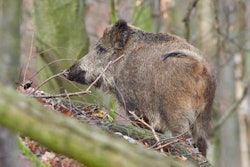
Official reports from the animal health authority in the Philippines confirm a further 1,049 African swine fever (ASF) outbreaks in the country.
According to the two notifications received recently by the World Organisation for Animal Health (WOAH), all of the outbreaks covered began in 2023, and were reported retrospectively.
One series of reports broadly covers the island of Luzon, where first detection of the ASF virus was in July 2019. Including the latest notification, the outbreak total in this series has reached 1,299, directly affecting more than 412,500 domestic pigs.
There have been 1,003 confirmed outbreaks in a second series, covering the island of Mindanao and the Visayas regions. More than 71,300 domestic animals have been involved in those outbreaks, along with recent cases in warty pigs at a zoo in June 2023.
Active cases of the disease are present in 12 provinces in eight regions of the country. This is according to the latest update from the Bureau of Animal Industry — part of the Department of Agriculture — on February 20. Compared with the situation two weeks previously, the disease situation has been eased in two provinces and two regions.
Areas with the most communities affected by ASF at the end of last month were the city of Calapan and municipality of Victoria, with 34 and 15 affected by the disease, respectively. Both are located in Mindoro Oriental, a province in the Mimaropa region in the west of the Philippines.
Soaring pork prices in Philippines linked to ASF
Ongoing outbreaks of ASF are being blamed for instability in the pork market in the Philippines.
According to BNN Breaking, the prospect of an ASF vaccine offers some hope for a return to market stability and a fall in retail prices.
Outbreaks on Luzon since mid-2023 have reduced the hog population, and prices have risen sharply. This is despite significant pig meat imports and Department of Agriculture efforts to manage the nation’s pork supply, according to the report. For Agriculture Secretary Francisco Tiu Laurel Jr., vaccines developed in Vietnam and the United States offer the prospect of eradicating ASF from the Philippines. These could be approved this year, he said, which would represent a turning point in combating ASF and stabilizing pork supplies and prices in the country.
More than 3 million of the nation’s pigs have been lost to ASF, according to The Philippine Star.
Laurel said two companies — one Vietnamese and one American — are already seeking regulatory approval for their vaccines from the nation’s Food and Drug Administration. Two other firms from Vietnam and Thailand have expressed an intentions to apply for authorization.
According to market analysts, the absence of a commercially available ASF vaccine lies behind the slow recovery in pork production in the Philippines.
Prior to ASF, national hog production averaged 2.25 million metric tons (mmt) per year, according to official data cited in the report. From a low point of 1.69 mmt in 2021, output has crept up to 1.74 mmt in 2022, and 1.79 mmt last year.
ASF returns to Bhutan
After a three-month hiatus, the ASF virus has been detected again in Bhutan.
According to an official notification to WOAH, swill feeding was the source of infection in a backyard herd.
During the second week of February, one of the six pigs died at the premises in the southeastern district of Pemagatshel. Subsequently, presence of the ASF virus was confirmed.
The outbreak appears to be within about 20 kilometers of the border with India.
Subsequently, media have reported further cases in Bhutan. Last week, the disease was linked to the deaths of six pigs out of a herd of 58 animals in the southern district of Dagana, according to LiveMint.
A four-day training session was held in February to support field veterinary officials managing ASF. With more than 60 participants, the session was described as an “ASF outbreak detection and response simulation exercise,” reported Kuensel Online.
Since ASF was first detected in Bhutan, it has presented formidable challenges to the nation’s agriculture sector, according to this source, particularly in the south of the country.
Training sessions were funded by the United Nations’ Food and Agriculture Organization (FAO).
ASF cases in domestic pigs elsewhere in Asia
Last month, MyRepublica reported that ASF had been detected in five districts of Nepal. These include Kathmandu, the nation’s capital city.
Based on WOAH notifications, ASF was first detected in the country in February 2022. No new cases were identified between May 2023 and January, when three outbreaks were confirmed in Gandaki province.
Latest update on the ASF situation in Asia from the FAO refers to a series of outbreaks in three states in India. In the northeastern state of Mizoram, pigs have tested positive for the virus in one district. Mortality of animals in two districts of Maharashtra in the west of India were blamed on ASF, and the disease was also reported in the southern state of Kerala.
Since the start of 2024, the FAO reports there have been 69 ASF outbreaks in Vietnam (as of February 19). Located in 18 provinces, these have resulted in the culling of more than 2,500 pigs.
So far this year, the animal health agency in Indonesia has recorded 134 cases of ASF in pigs. This total includes 114 animals at 36 locations in East Nusa Tenggara, and the first cases of the year in South Sulawesi, where 20 pigs were affected at two locations.
Further cases in South Korea’s wild boar
As of March 5, the number of ASF involving the nation’s wild boar population has reached 3,731. This represents the total since the first cases in September 2019, according to Pigs & People.
Over the past four weeks, this figure has increased by 69, mainly due to new cases detected in the eastern province of North Gyeongsang. It is one of five provinces in which previous cases in this population have been confirmed.
Most recent ASF outbreaks in domestic pigs were reported by South Korea in mid-January. The nation’s total outbreaks in this population remains at 40.
Update on ASF situation in Hong Kong
Two weeks ago, the Secretary for Environment and Ecology updated the Legislative Council of the Hong Kong government on the ASF situation in the Special Administrative Region. Since November 2023, outbreaks have been confirmed at 10 farms, resulting in the culling of 17,457 pigs.
Over the past five years, one ASF outbreak occurred in 2021, seven outbreaks in 2023, and there have been four outbreaks in 2024 (up to February 20). No cases were detected in the territory during 2019, 2020 or 2022.
For the government and the population of Hong Kong, local pig farms are a valued source of quality fresh meat. Presence of ASF is a threat to the sustainable long-term development of Hong Kong’s agricultural sector.
Some farmers report that licenses have been revoked or not renewed by the authorities for premises that do not comply with official standards. Since 2019, slaughterhouses have been required to empty lairage areas of pigs overnight so they can be cleaned effectively. Cleaning and disinfection of vehicles moving pigs between farms and slaughterhouses have been requirements since 2021.
As the presence of wild pigs poses a threat of the transmission of diseases including ASF, a program of capturing and culling these animals has also been in place since 2021. In 2023, around 500 animals were dispatched in this way. Surveillance systems have been set up around some pig farms in order to detect wild pig activity.
The authorities in Hong Kong are aware of the development of ASF vaccines in other territories, and are monitoring the situation. To date, they are following the advice of WOAH to delay approval of any vaccine until its efficacy and safety have been proven. It warns that substandard vaccines — apart from not effectively protecting pigs from infection — could allow genetic mutation of the vaccine strain, making future control of the disease even more difficult.
View our continuing coverage of the global African swine fever situation.
CSF detected on Japanese pig farm
Latest notification from the veterinary authority in Japan to WOAH outlines a further outbreak of classical swine fever (CSF).
In mid-February, presence of the CSF virus was confirmed in a herd of 1,127 pigs after one animal died and 14 showed signs of the disease. The affected premises was located in the Tochigi city area.
Tochigi is part of the Kanto region of Japan, which includes Greater Tokyo, and covers central-eastern Honshu.
Based on WOAH notifications, this is the first outbreak of 2024 among Japan’s domestic pigs, after four outbreaks last year, and nine in 2022. It brings the country’s total CSF outbreaks since 2018 to 90, and the number of pigs directly impacted over that period to just over 89,600.
Tochigi was among the 29 prefectures where wild boar tested positive for the CSF virus in the three months starting July 1, 2023. This is the period covered by the latest notification to WOAH on CSF cases among the Japanese wild boar population.
Like ASF, CSF (also known as hog cholera) is a notifiable disease that affects members of the pig family, according to the WOAH. Both diseases can cause devastating losses in domestic and wild populations, while not affecting human health. Despite the similar names, CSF and ASF are caused by unrelated viruses.
















